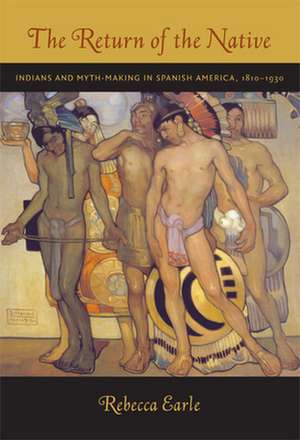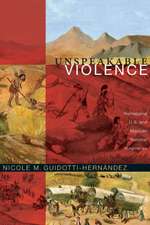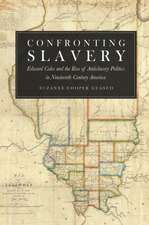The Return of the Native – Indians and Myth–Making in Spanish America, 1810–1930
Autor Rebecca A. Earleen Limba Engleză Paperback – 27 dec 2007
Preț: 300.62 lei
Nou
Puncte Express: 451
Preț estimativ în valută:
57.53€ • 59.70$ • 48.09£
57.53€ • 59.70$ • 48.09£
Carte tipărită la comandă
Livrare economică 17-31 martie
Preluare comenzi: 021 569.72.76
Specificații
ISBN-13: 9780822340843
ISBN-10: 0822340844
Pagini: 376
Ilustrații: 25 illustrations
Dimensiuni: 205 x 147 x 31 mm
Greutate: 0.49 kg
Editura: MD – Duke University Press
ISBN-10: 0822340844
Pagini: 376
Ilustrații: 25 illustrations
Dimensiuni: 205 x 147 x 31 mm
Greutate: 0.49 kg
Editura: MD – Duke University Press
Cuprins
Introduction: On Indians; 1: Montezumas Revenge; 2: Representing the Nation; 3: Padres de la Patria: Nations and Ancestors; 4: Patriotic History and the Pre-Columbian Past; 5: Archaeology, Museums, and Heritage; 6: Citizenship and Civilization: The Indian Problem; 7: Indigenismo: The Return of the Native?; EpilogueAppendix: Abolishing the Indian?
Recenzii
An ambitious and important contribution to Latin American cultural and intellectual history, The Return of the Native is unique in its broad, comparative focus on nationalism in Spanish America and the uses of the Amerindian past. Moreover, it is refreshing in its attention to nineteenth-century historiography and the relation between that historiography and the process of state-building. Raymond B. Craib, author of Cartographic Mexico: A History of State Fixations and Fugitive Landscapes[A] fascinating and informative picture of the ways that Spanish American elites in the first century after independence appropriated the Indian in their attempts to create national identities for the new republics...Earles book is an important contribution to the intellectual and cultural history of the period...it is a fascinating story and a welcome addition to the history of the nineteenth century.- Peter Blanchard, Bulletin of Latin American Research, Vol. 28, No. 2, April 2009
Notă biografică
Textul de pe ultima copertă
"An ambitious and important contribution to Latin American cultural and intellectual history, "The Return of the Native" is unique in its broad, comparative focus on nationalism in Spanish America and the uses of the Amerindian past. Moreover, it is refreshing in its attention to nineteenth-century historiography and the relation between that historiography and the process of state-building."--Raymond B. Craib, author of "Cartographic Mexico: A History of State Fixations and Fugitive Landscapes"
Descriere
How Latin American countries have used their Indian heritages in the rewriting of their own national histories











